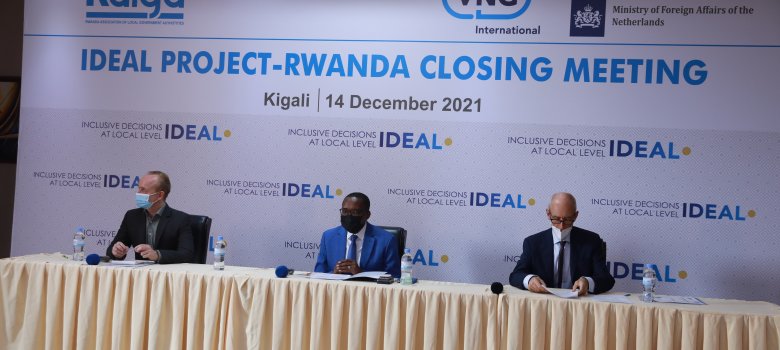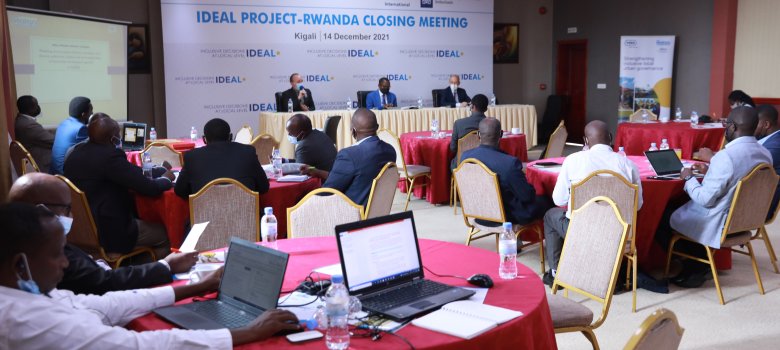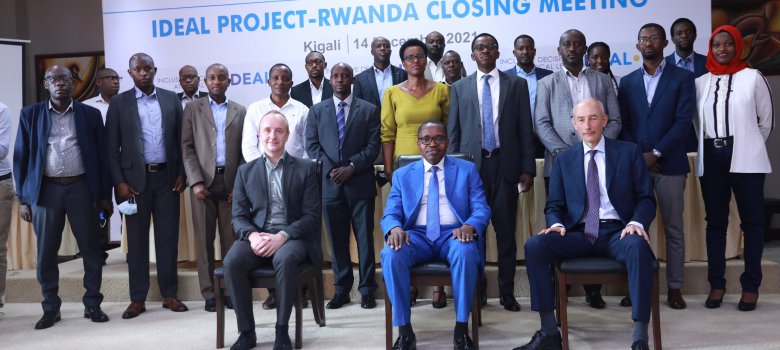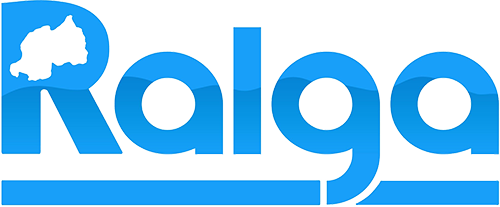The Secretary General of the Rwanda Association of Local Government Authorities, Ladislas Ngendahimana, has said that; “IDEAL Rwanda Project is closing but not ending”, because RALGA and all other stakeholders remain committed to sustaining its achievements.
The remarks came out during a closing event of the Inclusive Decisions at Local Level Project (IDEAL), which took place in Kigali on 14 December 2021. Participants included the Ambassador of the Kingdom of the Netherlands in Rwanda, H.E Matthijs Wolters, the Secretary General of RALGA, Ladislas Ngendahimana, among other senior officials from Districts, the City of Kigali and partner institutions.

The closing meeting was an opportunity for stakeholders to take stock of the project achievements in the last five years of implementation and its impact on secondary cities districts on one hand, and to commit –as promoters or beneficiaries- to the sustainability of the achievements.
RALGA in collaboration with VNG International implemented the IDEAL Project in Rwanda from mid-2017 to December 2021, with funding from the Netherlands Ministry of Foreign Affairs.
The beneficiary districts were all the six Rwandan secondary cities districts, namely; Muhanga, Huye, Rusizi, Rubavu, Musanze and Nyagatare. It focused and promoted inclusive urban governance through capacity building, advocacy, representation, citizen participation and stakeholder engagement in local urban governance, thus “inclusive decisions at local level”.
The main objective of the IDEAL project in Rwanda was to enable social contract between secondary cities districts authorities, the citizens and local stakeholders on local urban development.
The project’s activities consisted of capacity building in terms of trainings, learning study visits, developing user-friendly toolkit handbooks for service providers, demonstration projects, awareness campaigns, stakeholder policy dialogues and advocacy research.
The project funding for RALGA implemented activities in the five years amounted to 649,904 Euros.
Stakeholders and partners speak
The Secretary General of RALGA, Mr. Ladislas Ngendahimana expressed his gratitude to the Government of Rwanda and the Kingdom of the Netherlands, for their consistent support to RALGA.
“This is the time for gratitude to our partners and friends. The partnership between RALGA, VNG International has always been one of the best, characterized by mutual respect and frank discussions”, he said.
“Allow me to commend the support of the Kingdom of the Netherlands for financing the IDEAL Project. RALGA was created with a mission to support Local Governments of Rwanda to comply with principles of good governance and decentralization, to create an environment where leaders and citizens are stakeholders in local development. We are proud and happy that, RALGA never lost that focus. We remain committed, now than ever before”, Ladislas noted.
Ambassador Matthijs Wolters of the Kingdom of the Netherlands in Rwanda commended the good partnership between his country and Rwanda on one hand, and that of VNG International and RALGA on the other hand. He said that, both Governments agreed on the areas of cooperation, and he congratulated both Associations of Local Authorities for supporting their respective Governments.
“This IDEAL Project that we close today contributed to the financial sustainability of RALGA, institutional strengthening through policies, strategies, toolkit handbooks and training modules on one hand, but also contributed to enhancing social contract between leaders and citizens at local level”, Ambassador Matthijs said.
“Through pro-poor land subdivisions plans, availability of municipal land readjustment guidelines and various stakeholder engagement instruments that were developed, building on the existing platforms for decision making and policy formulation, we are confident that the closing of IDEAL project is in good hands and sustainable”, he added.
The Ambassador of the Netherlands also clarified that, there will not be a second phase of IDEAL project, because both Governments agreed in 2018 on new priority areas of cooperation, which are private sector development, trade and investment.
He however added; “this is not the end of our support to the Rwanda Association of Local Government Authorities. It has been there for the last twenty years, and our partnership goes beyond IDEAL project”.
Daan Stelder, the IDEAL Project manager at VNG International commended the good collaboration between stakeholders as a key factor of the project’ success.
“In implementing the IDEAL program, we have been able to build on 20 years of cooperation with RALGA. This combined with active participation and advice of our government, partners and secondary cities districts authorities, has greatly contributed to its success,” said Daan Stelder.
Officials from secondary cities that benefited from the project also commended its impact and committed to apply lessons learnt in fostering inclusive urbanization in their respective Districts.

“This project has helped us to engage all stakeholders in the urbanization process. We have been able to bring on board universities located in our district to give technical support in terms of urban planning. The project also provided a platform for engagement with the private sector, civil society as well as citizens especially in land subdivision, master plan development and implementation”, said Kamana Andre, the Vice Mayor in Charge of Economic Development in Huye District.
Sustainability of IDEAL gains guaranteed
The Secretary General of RALGA gave assurance of sustainability of IDEAL project gains.
“RALGA did not work in isolation. IDEAL project did not establish parallel structures. Alignment of IDEAL interventions with the existing structures is key to sustainability after the closing of the project. The existing dynamics of consultations and discussions through policy dialogues, different platforms for policy actions such as Urbanization and Rural Settlement; Governance and Decentralization as well as Social Protection Sector Working Groups shall remain there for the sustainability of the gains from IDEAL project”, he said.
Despite challenges, achievements are meaningful
The last two years leading to the closing of IDEAL project coincided with the COVID19 pandemic and associated restrictions to curb its spread. Restrictions included total or partial lockdowns and banning public meetings and gatherings. This situation affected the performance of the project, whose delivery would depend mainly on stakeholder engagement and capacity building services delivered through workshops and study visits.
Despite the challenges, IDEAL project delivered meaningful results.
“The gender equality agent of change coaching program and the adoption of municipal land readjustment guidelines are clear indicators of the positive impact of IDEAL at local and national level. Moreover, the production of strategic documents as well as training modules for RALGA is a clear sign of institutional strengthening. The five years of IDEAL project have not been a vain”, said Ladislas Ngendahimana, the Secretary General of RALGA.
Districts urged to sustain and replicate best practices
RALGA believes that, sustainability of IDEAL project shall also and largely depend on how beneficiary districts shall commit themselves to sustain and replicate the lessons learnt and best practices.
“We encourage particularly the Secondary Cities Districts in collaboration with their partners to take measures to perpetuate some identified and promoted good practices under IDEAL project. They include ‘Umujyi Wanjye’ campaign on inclusive cities, pro-poor land subdivision plan design, engagement of private sector and higher learning institutions through Joint Action Development Forum, advancement of identified and assessed potential public private partnerships projects as well as gender mainstreaming via trained transformative agents of change and others”, the Secretary General of RALGA said.
The project funding for RALGA implemented activities in five years amounted to 649,904 Euros, with additional budget managed directly by VNG International in The Hague, Netherlands.
VNG International has collaborated with RALGA since its inception in 2002 up to now.


